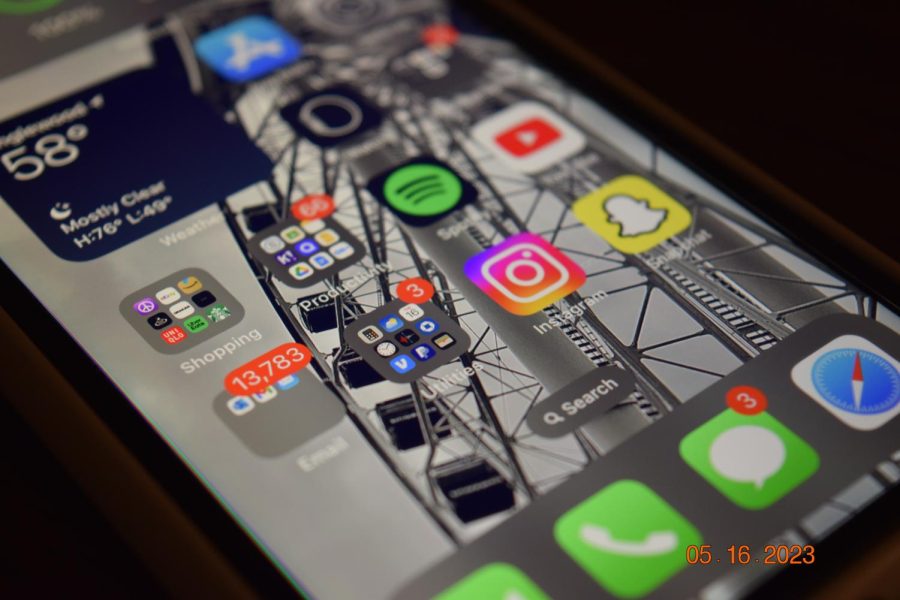Phones and Productivity, How Do We Manage Them?
May 19, 2023
Phones are one of the most important possessions to most high school students. Having access to the internet at all times and being able to communicate with anyone at any time is certainly valued by students. But at a time like highschool where prolonged focus and studying is essential, smartphones can be just as distracting as they are helpful to students.
Many Creek students would agree that their phones can be a disturbance, especially when trying to get work done. Notifications are constantly buzzing our phones, making it difficult to concentrate on work.
“My phone is very distracting,” junior Mitch White said. “If I look at my phone or I turn on messages or notifications, that’ll distract me from my work and stop my productivity.”
Even though phones can be hard to get away from, some students find little ways to help them resist the temptation and continue with their work. White turns off his phone and tries not to focus on it when he is trying to get work done.
Other ways include physically removing one’s phone. “Sometimes I throw my phone across the room, that’s my best strategy, or intentionally leave it somewhere so that it’s actually inaccessible,” senior Amaya Nicklas said.
Nicklas doesn’t find herself on her phone nearly as much as other teenagers. According to the American Academy of Child & Adolescent Psychiatry most teenagers spend up to nine hours using screens, while Nicklas has a screentime of only around three hours a day.
“I have snapchat notifications off which helps a lot,” Nicklas said. “I have social media but I don’t use Snapchat that much. I have notifications off for Instagram also and I deleted Tik Tok, so that’s mostly why my screen time is not that high.”
Senior Christian De Zabala has a specific mentality that makes him more productive.
“Most of the time I just use [my phone] as a kind of study reward system for myself, so it’s not like I’m actively getting distracted by it because I tell myself, “Oh, let me get this done real quick, and then I’ll give myself 5 to 10 minutes,” De Zabala said.
De Zabala finds new things to learn to distract himself from his phone. He recently started online courses, and he began teaching himself to code. De Zabala used the online website Coursera to try to pick up new hobbies that interested him.
Senior Charlie Flaxbeard, on the other hand, feels that his strategy to decrease phone usage could be improved.
“The incorrect answer is watch TV, isn’t it?” Flaxbeard said. “Because that’s what I do, but if I didn’t have access to my phone, I would definitely read more books and I would probably practice sports more. Practice golf, go play basketball in the gym, or play ultimate frisbee.”
Having such a wide variety of apps and websites, students seem to have something different that disrupts them from getting work done. De Zabala gets distracted by Tiktok or Snapchat because he gets the most notifications from his friends on those apps. If he didn’t have his phone, De Zabala believes he would be able to focus on more beneficial activities.
“There’s just different things for me to do [without my phone],” De Zabala said. “I keep myself busy by working on a project, reading, studying, or just hanging out with friends.”
For White, the most distracting aspects of his phone are text messages and video games. Some of his videogames have him check in during certain hours to get a reward in the game. But even though most students view their phones as a distraction to their productivity, they still find that the positives to owning one outweigh the negatives.
“I think having a phone is definitely more beneficial than not having a phone, because you have quick access to the internet, quick access to communication with all of your friends, and it’s overall more convenient than having to ask the teacher the next day for answers,” Flaxbeard said. “You can just look it up on your phone. If the answer is right there on your phone, it’s faster for me and more efficient than asking my teacher.”
While Creek students believe that phones are useful when it comes to communication and connectivity, they also prove to be a huge disruptor to focus and productivity. But even though students seem to agree that they can’t just give up their phones, they still believe that this could be beneficial.
“I think it would make me more aware of my current surroundings,” De Zabala said.






















